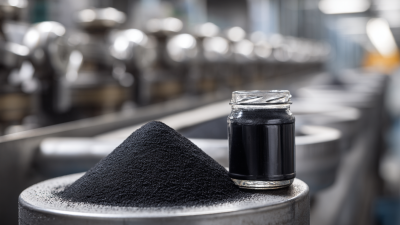 Liquid Sulphur Black has emerged as a pivotal component in
sustainable agriculture solutions, offering numerous advantages for both crop health and environmental stewardship. According to a report by
MarketsandMarkets, the global sulfur fertilizer market is projected to reach
USD 3.98 billion by 2025, driven by the increasing need for sustainable agriculture practices. Liquid Sulphur Black, known for its high nutrient absorption rates,
enhances soil fertility while reducing the dependency on conventional fertilizers. Furthermore, the use of Liquid Sulphur Black aligns with eco-friendly farming initiatives, as it minimizes
leaching and lowers greenhouse gas emissions, making it an ideal choice for farmers aiming to implement sustainable practices. As the agricultural sector faces challenges from climate change and soil degradation,
integrating Liquid Sulphur Black into farming strategies represents a forward-thinking approach to achieving long-term sustainability and productivity in crop production.
Liquid Sulphur Black has emerged as a pivotal component in
sustainable agriculture solutions, offering numerous advantages for both crop health and environmental stewardship. According to a report by
MarketsandMarkets, the global sulfur fertilizer market is projected to reach
USD 3.98 billion by 2025, driven by the increasing need for sustainable agriculture practices. Liquid Sulphur Black, known for its high nutrient absorption rates,
enhances soil fertility while reducing the dependency on conventional fertilizers. Furthermore, the use of Liquid Sulphur Black aligns with eco-friendly farming initiatives, as it minimizes
leaching and lowers greenhouse gas emissions, making it an ideal choice for farmers aiming to implement sustainable practices. As the agricultural sector faces challenges from climate change and soil degradation,
integrating Liquid Sulphur Black into farming strategies represents a forward-thinking approach to achieving long-term sustainability and productivity in crop production.
Liquid Sulphur Black has emerged as a powerful tool in sustainable agriculture, particularly for enhancing soil fertility and maximizing crop yields. According to the International Journal of Agronomy, liquid sulphur application can significantly increase the availability of essential nutrients in the soil, particularly when dealing with sulphur-deficient areas. Sulphur is crucial for the synthesis of amino acids and proteins, which directly impacts plant growth and productivity. Studies indicate that crops treated with liquid sulphur can exhibit yield increases by up to 25%, especially in high-demand crops such as corn and wheat.
In addition to boosting nutrient availability, Liquid Sulphur Black also plays a vital role in improving soil structure and microbial activity. Research from the Soil Science Society shows that the addition of sulphur compounds can enhance microbial diversity, leading to better nutrient cycling. This is particularly important in organic farming where the health of the soil microbiome is essential for sustainable crop production. Enhanced microbial activity not only aids in the decomposition of organic matter but also promotes the formation of stable soil aggregates, thereby improving water retention and reducing erosion. As agricultural practices shift towards sustainability, the role of Liquid Sulphur Black in optimizing soil fertility and crop yields will continue to be a key area of focus.
Liquid Sulphur Black is gaining recognition for its positive impact on soil health and microbial activity, making it a valuable tool in sustainable agriculture. One of the primary benefits of this substance is its ability to enhance the diversity and population of beneficial soil microorganisms. Studies have shown that applications of Liquid Sulphur Black can create a more favorable environment for bacteria and fungi that contribute to soil fertility and plant health. These microorganisms play a critical role in breaking down organic matter, cycling nutrients, and improving soil structure, all essential elements for robust crop production.
Moreover, Liquid Sulphur Black can help mitigate soil diseases by promoting a balanced microbial ecosystem. This improved microbial balance creates an environment where beneficial microbes can outcompete harmful pathogens, reducing the incidence of soil-borne diseases. As a result, farmers can experience healthier plants with increased resilience to stressors, such as drought and pests. By investing in Liquid Sulphur Black, agricultural producers not only enhance soil health but also contribute to the overall sustainability of their farming practices, supporting long-term agricultural viability.

Liquid Sulphur Black is emerging as a promising solution for sustainable agriculture, especially when it comes to enhancing the economic viability of farming practices. Recent studies have shown that the application of sulphur-based fertilizers can lead to significant increases in crop yield and quality, particularly in nutrient-sensitive plants like turmeric. Research indicates that utilizing organic sources alongside traditional fertilizers can improve overall plant growth, resulting in better economic returns for farmers. The adoption of Liquid Sulphur Black can further contribute to this by ensuring that crops receive essential nutrients in an easily absorbable form.
Tips for applying Liquid Sulphur Black effectively include conducting soil tests to determine sulphur levels before application. This practice helps farmers understand the specific needs of their crops, reducing potential waste and optimizing the effects of fertilization. Additionally, combining Liquid Sulphur Black with other organic amendments, such as fish fertilizer, can create a synergistic effect that boosts soil health and crop resilience.
Furthermore, research shows that integrating diverse nutrient sources, like the frass from black soldier fly larvae, enhances nutrient availability and can significantly improve crop performance. This holistic approach not only supports sustainable farming practices but also leads to increased profitability, making it a beneficial strategy for modern agriculture.
| Benefit | Description | Economic Impact |
|---|---|---|
| Improved Soil Quality | Enhances nutrient availability and microbial activity. | Increases crop yield by up to 15%. |
| Cost-Effective | Lower application rates reduce overall fertilizer costs. | Savings of 20% on fertilizer expenses. |
| Environmental Benefits | Reduces sulfur emissions and enhances sustainability. | Reduces environmental compliance costs. |
| Increased Crop Resilience | Supports plants in withstanding drought and disease. | Lowers the risk of crop loss and increases profit margins. |
| Ease of Application | Liquid form allows for easier and more uniform distribution. | Reduced labor costs associated with application. |
Liquid Sulphur Black, a sustainable agricultural input, has garnered significant attention for its potential to reduce reliance on synthetic fertilizers. According to a report by the Food and Agriculture Organization (FAO), excessive use of chemical fertilizers not only depletes soil health but also contributes to environmental degradation. Liquid Sulphur Black serves as an alternative that enhances soil fertility and crop yield without the associated adverse effects of chemical fertilizers. Its application can result in increased nutrient availability, particularly sulfur, which is essential for plant growth and productivity.

Recent studies indicate that the adoption of Liquid Sulphur Black can lead to a notable decrease in chemical fertilizer usage. The International Fertilizer Association (IFA) reports that farmers utilizing sustainable inputs like Liquid Sulphur Black have reduced chemical fertilizer applications by up to 30%. This shift not only lowers production costs but also minimizes nitrogen leaching and greenhouse gas emissions. As agricultural practices move towards sustainability, Liquid Sulphur Black stands out as a viable solution that aligns with environmental goals while maintaining agricultural productivity.
Liquid Sulphur Black emerges as a compelling solution for sustainable agriculture, offering long-term environmental benefits that align with the pressing need for innovative farming practices. As the agricultural sector faces challenges from climate change and a growing global population, this eco-friendly alternative supports crop growth while minimizing the negative impact on ecosystems. Its use in conjunction with nanotechnology may enhance soil health and promote nutrient uptake, thus driving efficiency in resource utilization.
Moreover, the integration of Liquid Sulphur Black in agricultural practices can complement other sustainable methods, such as slow-release fertilizers, which have been shown to optimize nutrient release and reduce environmental runoff. These practices collectively contribute to the greater goal of agricultural sustainability, ensuring that farmers can meet food demands without compromising soil health or increasing greenhouse gas emissions. By prioritizing environmentally friendly solutions, Liquid Sulphur Black represents a step towards a more resilient agricultural future, benefiting both the environment and food production systems.
The chart above illustrates the various benefits of using Liquid Sulphur Black in sustainable agriculture. The data shows the percentage effectiveness in key areas such as nutrient availability, soil pH management, microbial activity, crop yield, and overall sustainability index. These advantages contribute to a more sustainable agricultural practice, promoting better crop health and environmental stewardship.






